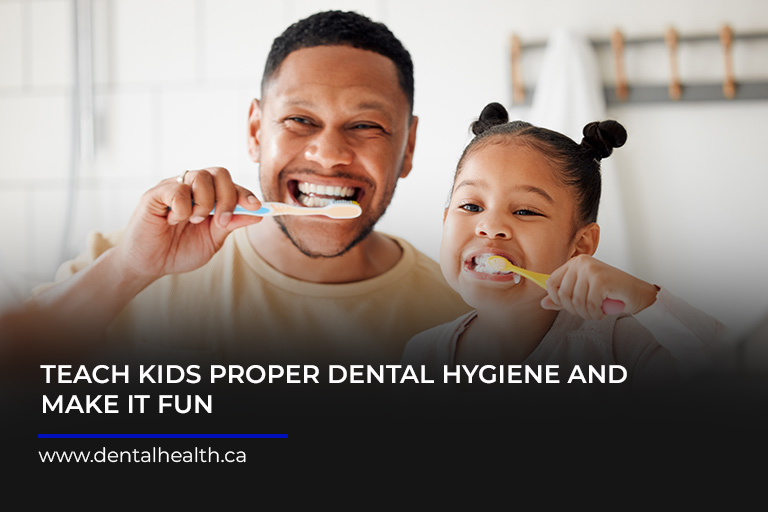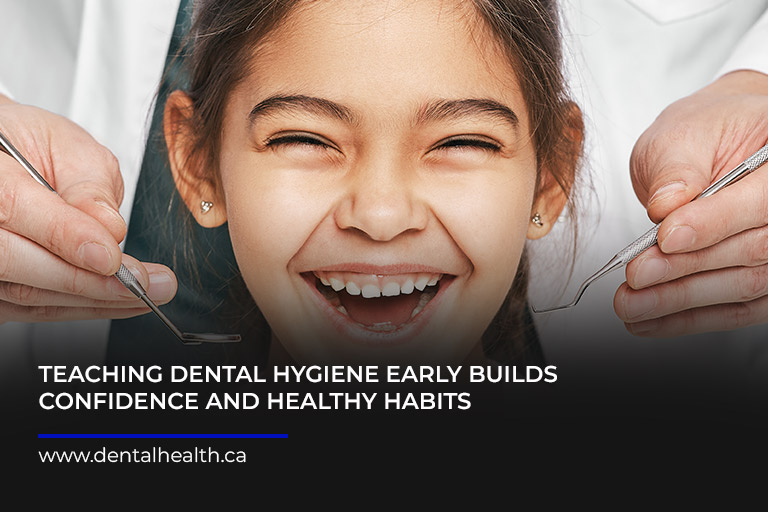A bright, healthy smile is a wonderful asset, and it’s never too early to start building good oral hygiene habits. For children, establishing a solid foundation for dental care sets the stage for a lifetime of healthy teeth and gums. While it might seem like a simple task, maintaining proper dental hygiene for kids requires consistent effort and guidance from parents.
The prevalence of dental problems in children highlights the importance of early intervention. According to the Canadian Dental Association, tooth decay is one of the most common chronic diseases in Canadian children. By taking proactive steps to educate themselves and their children, parents can significantly reduce the risk of dental issues and promote optimal oral health.
From infancy to adolescence, consistent guidance and support can make a significant difference. Here are some practical tips to help parents navigate this important journey:
- Start early: Establish the foundation for proper dental hygiene even before teeth erupt. After feedings, gently wipe your baby’s gums with a moist towel to help remove bacteria and teach them about oral hygiene, laying the groundwork for a lifetime of dental hygiene.
- Brush twice a day: Once those first teeth emerge, establish a twice-daily brushing routine. Use a soft-bristled brush and a tiny smear of fluoride toothpaste for children under three, increasing to a pea-sized amount for older kids. This helps remove plaque and food debris, protecting their teeth from decay.
- Floss daily: Don’t overlook the spaces between teeth! As soon as two teeth touch, introduce flossing to your child’s routine. Flossing removes plaque and food particles from areas a toothbrush can’t reach, preventing cavities and gum disease.
- Limit sugary drinks and snacks: Sugary treats are a major culprit behind tooth decay. Encourage your child to drink water and choose healthier snacks like fruits and vegetables, limiting their intake of sugary drinks and snacks to protect their teeth.
- Schedule regular dental checkups: Prevention is key. Early dental visits allow for the detection and treatment of any potential issues before they escalate. Follow the Canadian Dental Association’s recommendations for regular checkups to keep your child’s smile healthy.
- Make brushing fun: Turn brushing into a positive experience. Use a fun timer, play their favourite song, or let them choose a toothbrush with their favourite character. These simple tricks can make brushing time enjoyable and something they look forward to.
- Set a good example: Children learn by watching their parents. Make sure you brush and floss regularly yourself, demonstrating the importance of oral hygiene. Your actions will speak louder than words and inspire your child to follow suit.
- Use age-appropriate dental products: Children’s mouths are delicate. Ensure the toothbrush, toothpaste, and floss you choose are designed for their age and development. This will make brushing and flossing more comfortable and effective.

- Be patient and encouraging: Brushing and flossing can be challenging for young children. Approach it with patience and offer plenty of praise and encouragement. Make it a fun and bonding experience, rather than a chore.
- Supervise brushing and flossing: Young children may not have the dexterity or understanding to brush and floss thoroughly on their own. Supervise their oral care routine until they’re around 7 or 8 years old to ensure it’s done correctly.
- Talk about dental hygiene: Explain to your child, in terms they can understand, why taking care of their teeth and gums is important. Help them connect oral health with overall well-being, fostering a sense of responsibility for their own dental care.
- Make dental visits positive experiences: A child’s first dental experiences can shape their attitude towards oral health for years to come. Choose a dentist who is experienced in working with children and create a positive and welcoming environment for their visits.
- Consider dental sealants: Dental sealants offer an extra layer of protection against cavities. Discuss this option with your dentist. Sealants can be especially beneficial for children prone to cavities, providing a barrier on the chewing surfaces of molars.
- Watch for signs of dental problems: Stay vigilant for any signs of trouble. Tooth cavity, sensitivity, bleeding gums, or persistent bad breath could indicate a dental issue. If you notice any of these symptoms, consult your dentist promptly for evaluation and treatment.
The Value of Teaching Children Dental Hygiene at an Early Age

Laying the groundwork for a lifetime of healthy smiles begins in the earliest years. Prioritizing dental hygiene for young children is not merely about preventing cavities; it sets the stage for overall well-being, fostering confidence, promoting healthy development, and cultivating positive associations with oral care.
- Safeguard against dental diseases: Tooth decay and gum disease are prevalent among children, leading to pain, discomfort, and even tooth loss. Early intervention through proper oral hygiene can significantly reduce the risk of these problems.
- Establish lifelong habits: Children are like sponges, readily absorbing the routines and practices around them. By teaching good oral hygiene from a young age, we instil habits that will likely carry into adulthood, promoting long-term dental health.
- Minimize future dental costs and interventions: Preventive care is always more cost-effective than restorative treatments. Early dental hygiene can minimize the need for extensive dental procedures later in life, saving both time and money.
- Boost confidence and self-esteem: A healthy smile can work wonders for a child’s confidence. By taking care of their teeth and gums, we help them feel good about themselves, which can positively impact their social interactions and overall well-being.
- Reduce dental anxiety: Early and positive experiences with dental care can set the tone for a lifetime of comfortable and stress-free dental visits.
- Promote overall health: Oral health is closely linked to overall health. By maintaining a healthy mouth, we reduce the risk of systemic health problems like heart disease, stroke, and diabetes.
- Support healthy development: Good oral hygiene supports proper chewing and digestion, crucial for a child’s growth and development. It also contributes to clear speech and articulation.
- Foster a positive relationship with dental professionals: Early and regular dental visits build trust and familiarity with dental professionals, making future appointments less daunting and promoting a proactive approach to oral health.
Establishing good oral hygiene habits early in life is crucial for preventing dental problems and ensuring a lifetime of healthy smiles. By following these tips and seeking professional guidance from a dentist, parents can empower their children to take charge of their oral health and enjoy the benefits of a confident, radiant smile.
For comprehensive dental care for your child, contact Kingsway Dental Centre at (905) 563-4001 to schedule an appointment.

